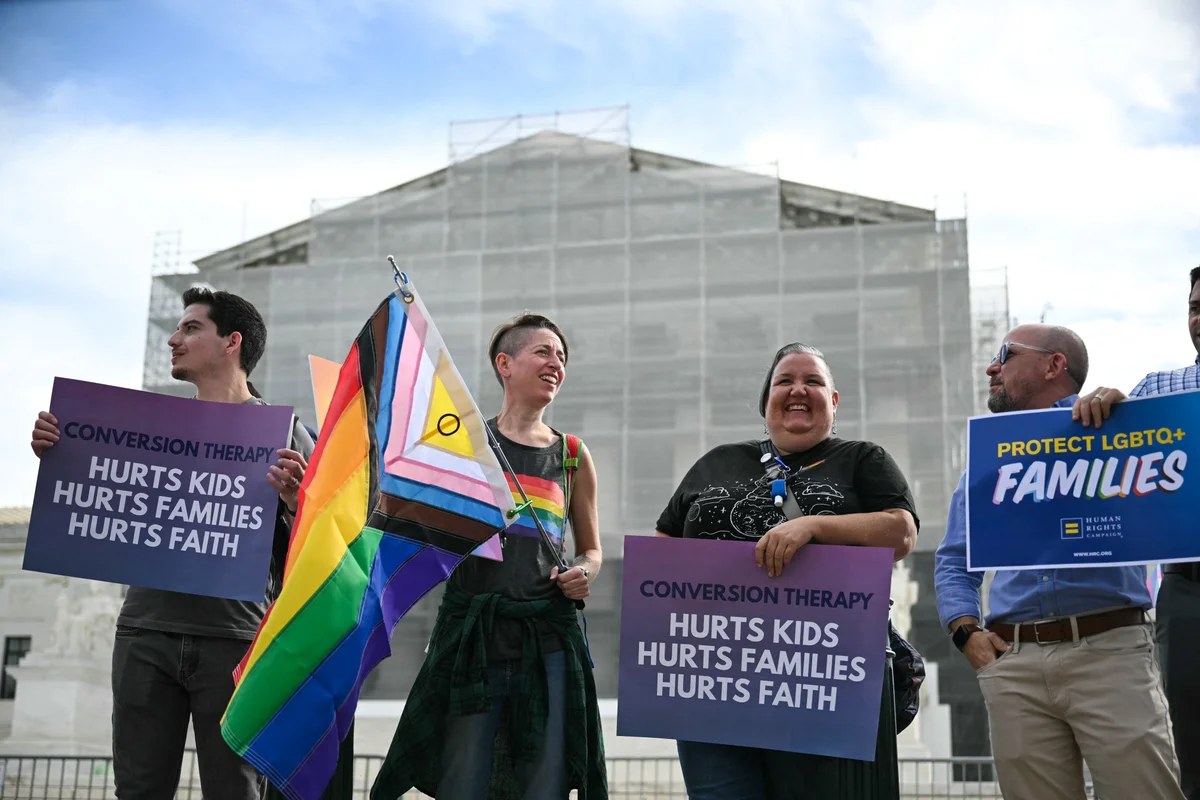
Today the U.S. Supreme Court heard oral arguments in the case Chiles v. Salazar, which challenges Colorado’s ban on conversion therapy, a discredited and often harmful practice of attempting to change someone’s sexual orientation or gender identity. Under the law, licensed mental health providers and physicians are prohibited from offering these treatments to minors.
The challenge to Colorado’s law was brought in 2022 by Kaley Chiles, a licensed professional counselor who “views her work as an outgrowth of her Christian faith,” as described in court documents. Her lawyers argued at Tuesday’s hearing that the law should be subject to a higher level of judicial scrutiny because it restricts Chiles’s freedom of speech, causing her “ongoing irreparable harm.”
Conversion therapy refers to a broad category of approaches to try to change a person’s sexual orientation or gender identity. It can involve talk therapy, medications, hypnosis or “aversive” techniques such as electroshock or inducing vomiting. Some programs are administered by religious ministries, others by health care professionals. Studies have found these attempted “treatments” to be both ineffective and dangerous, and they are associated with post-traumatic stress disorder (PTSD) and increased suicidality. A 2020 study found that LGBTQ+ people exposed to conversion therapy, most commonly from religious leaders, were nearly twice as likely to have ever had suicidal ideation than those who had not. A 2024 nationwide survey of U.S. LGBTQ+ youth conducted by the Trevor Project, a non-profit organization, found that 13 percent of respondents had been threatened with or subjected to conversion therapy.
On supporting science journalism
If you’re enjoying this article, consider supporting our award-winning journalism by subscribing. By purchasing a subscription you are helping to ensure the future of impactful stories about the discoveries and ideas shaping our world today.
The evidence of its ineffectiveness and risks has led 23 states to pass legislation banning or limiting the use of conversion therapy for minors. Colorado’s law, passed in 2019, prohibited state-licensed therapists or doctors from providing such treatments to people under age 18. Bans on conversion therapy are supported by the American Medical Association, the American Psychiatric Association and many other health care and mental health professional organizations.
Chiles’s lawyers argued that because her approach only involves talk therapy, Colorado’s law limits her freedom of speech by preventing her from providing it. The 10th Circuit Court of Appeals previously ruled that Chiles’s therapy taking the form of speech is incidental and that what is really being regulated is her professional conduct.
“A state cannot lose its power to regulate the very professionals that it licenses just because they are using words. A health care provider cannot be free to violate the standard of care just because they are using words,” a laywer representing Colorado said in her arguments today.
In an amicus brief filed to the Supreme Court, the American Psychological Association, the American Psychiatric Association and 12 other professional bodies argued that characterizing talk therapy as mere speech fundamentally misunderstands its therapeutic use and purpose.
“Therapy consists of evidence-based treatments and not mere ‘conversations,’” the organizations wrote. They noted that state licensure requirements exist to ensure that providers are competently administering safe and effective treatments. But conversion therapy efforts, they continued, “are potentially harmful, discredited practices, and are not supported by credible scientific evidence.”